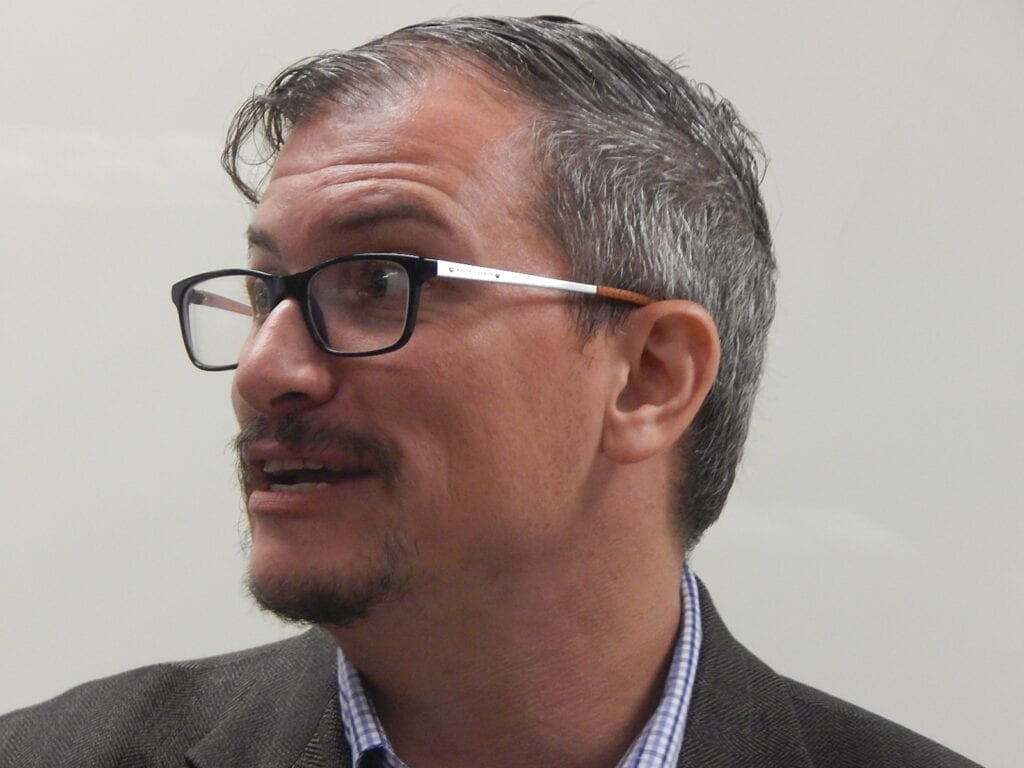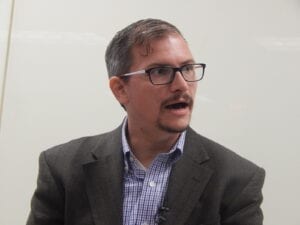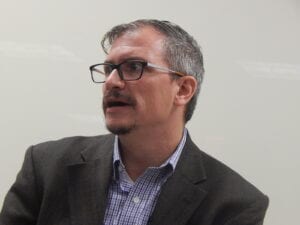Buzzfeed legal editor speaks on diversity
Buzzfeed legal editor Chris Geidner gave a talk on diversity as a part of the College of Communication and Information’s Diversity and Inclusion Week.

[title_box title=”Buzzfeed legal editor speaks on diversity”]
When Buzzfeed legal editor Chris Geidner began his keynote speech for Diversity and Inclusion week, he did not have a title for it. Geidner said he was a little surprised when hosts of the event told him he should have one. After laughing about it and tapping the arm of his chair a couple of times, Geidner created the title just before he began his speech.
“I’m going to make a statement and it’s a statement of fact and it’s one I hope I can convince you of,” Geidner said.
Geidner announced the name of his talk to his audience seated in the Patrick auditorium: “Diversity is essential.”
To provide an explanation as to how he was able to understand this statement for himself, Geidner had to talk about his own identity.
“I’m going to tell you why a white guy from Ohio decided that diversity is essential to him,” Geidner said.
Geidner began with an explanation of his background. He describes himself as an openly gay, cisgender White male who came out to friends and family 20 years, as a freshman at American University. It is a part of the story Geidner’s brother, Nick Geidner, assistant professor in the School of Journalism and Electronic Media, is familiar with.
Geidner also describes himself as a “lawyer, politico, journalism comms person,” in reference to the fact that Geidner has gone to law school at the Ohio State University Moritz College of Law and worked as a counsel to and then principal assistant of the Ohio attorney general’s office before the attorney general of Ohio resigned. He started working as a journalist six years ago, starting off as a contributor to the Metro Weekly in the District of Columbia. Geidner was able to use his prior experiences to help create and tell the stories he encountered while working there.


Geidner stayed at Metro Weekly for almost three years before accepting a position as the senior political and legal reporter at Buzzfeed in July 2012. At the time, Buzzfeed’s office in the District was not exactly full. In fact, Buzzfeed was still relatively small.
“I was the 127th employee at the time I was hired,” Geidner said.
While working at Buzzfeed, Geidner has used his strengths in the law as well as his own life experiences as a gay man to develop stories many other publications were not considering. He quickly started to work on stories involving the Defense of Marriage Act and he said that his coverage on the act gave Buzzfeed a six-month head start on the subject.
Marriage equality eventually became Geidner’s focus; he followed the story all the way up to the June 26 Supreme Court decision. It was the kind of coverage that helped Geidner earn the National Gay and Lesbian Journalists Association award for journalist of the year in 2014.
After presenting himself to the audience, Geidner shared his five reasons why diversity is essential.
Reason one: It’s the right thing to do. Geidner said diversity was what was morally correct for us. He said this reason was the most simple.
“It’s also kind of the least important reason,” Geidner added.
Reason two: It’s good business. According to Geidner, having people with different perspectives produces different answers and different ways of reporting stories. It also helps publications reach out to demographics and audiences they’d never been announced. Geidner used his first experiences at Buzzfeed as an example. Geidner said when he first arrived, he made sure to let his bosses know that Buzzfeed was “really, really white” and they had to fix that. He also talked about how Buzzfeed started making sure they were sharing their job postings with more journalists of color.
“When a top Black journalist shares our job posting, that’s a whole group of people who are going to see it,” Geidner said.
Reason three: it’s the smart thing to do. Geidner re-emphasized the necessity of different experiences and perspectives. He said it makes it easier to have someone different than him look at stories while he’s writing them.
“It’s just bad journalism not to do it,” Geidner said. “You cannot ask all of the questions.”
Reason four: It is pragmatic. It simply makes the most sense to be working towards diversity.
“If you’re avoiding diversity at this point, you’re missing America,” Geidner said.
And finally, reason five: It is unavoidable. Geidner said people are going to get diverse stories whether or not a certain publication takes the time to craft them.
“You can’t not, because the story is going to happen,” Geidner said. “It’s basically malpractice at this point.”
Geidner wanted the audience to know that diversity is not easy to implement. He said it takes awareness of different people and issues, leadership that is willing to change the environment of their workspaces and intentionality–everyone has to try to work on it. And just hiring people is not enough. According to Geidner, publications must start promoting, including and giving authority to diverse groups of people before they can say they are diverse.


As for Geidner’s future, he is now starting continuous coverage on the death penalty in America. Geidner said it took six months of convincing all of his editors to be on board with making the death penalty his new focus, but he is now tracking executions across the country. Geidner has a partner working with him on the death penalty focus; he is also named Chris.
“We’re the ‘Death Chrises,’” Geidner said.
It’s another example of what Geidner calls “story-telling operations.” Geidner said as long as writers and publications are willing to work to include others, diversity will not fail.
“If you have an operation that’s willing to get involved in a conversation and has the resources to do it,” Geidner said, “then those things become bonuses.”
Chris Geidner’s work can be found on his Buzzfeed profile.
Edited by Jessica Carr
News editor, Courtney Anderson, has been telling stories for as long as she can remember. From scribbling short stories on the back of pamphlets to excelling in Advanced Placement English courses in high school, Anderson has always been determined to make a career out of writing. Anderson joined TNJN as a freshman and instantly fell in love with online news. She hopes to become an editor for a major online news source one day.



